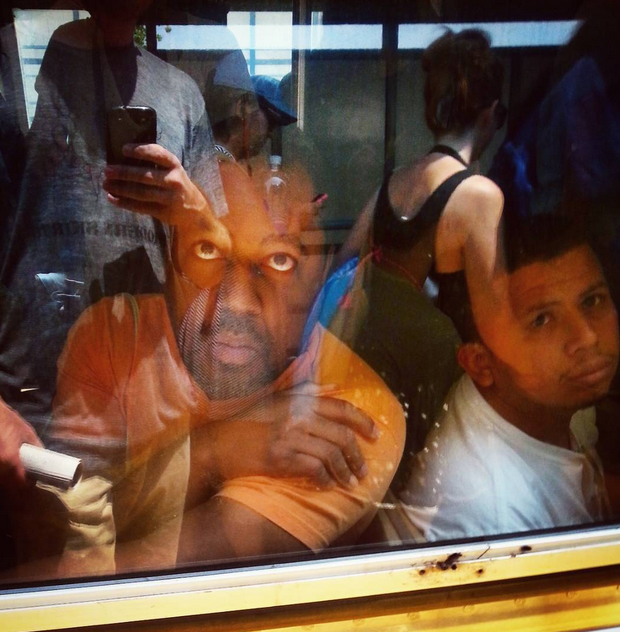
For two months now, photographer Nathan Fitch has been taking selfies with complete strangers, uploading them to Instagram in an attempt to discuss people’s fixation with technology, he says in an interview with TIME LightBox.
Josh Raab: What is @strangerselfieproject?
Nathan Fitch: Stranger Selfie is an Instagram-based project that uses the popular phenomenon of the selfie to create images related to the modern fixation with technology, social media, and communication. The project is meant to address themes of cultural narcissism, voyeurism, isolation and surveillance, while drawing parallels to shared humanity. Each picture represents a brief encounter with a stranger, mostly in the fast moving throngs of a giant city, often with their eyes glued to the screen of their phone.
Josh Raab: What inspired you to begin this project?
Nathan Fitch: Years ago, I spent a summer in New York City. At the time, I had a summer job picking wild flowers in New Jersey, which required that I wake up very early in the morning. On my commute to work, I would often see amazing light on the train, which ran above ground. Feeling apprehensive of openly photographing my fellow subway passengers, I rigged a camera inside a Kleenex box with a small hole in the front. Each time I would take a photograph, I would sneeze to cover the sound of the shutter. Today, every phone is a camera, and my Kleenex box is no longer needed.
All the images for the Stranger Selfie project are shot on the Samsung Galaxy 3. It’s an old phone, certainly not the one with the best technical specs, and maybe that is what I like about it. The concept for the project is a humble one, the framework of the “Selfie”.
Another initial inspiration was Image America by photographer Robert Clark, who spent 50 days driving across the country photographing with a Sony Ericsson phone. I loved the intimacy of some of the images in diners and gas stations, which would have been changed if a larger, more professional camera had been used. In general, all the reflections in windows in New York City provides a never ending inspiration for potential selfies with strangers.
The approach I’ve taken to this project uses a phone, the tool used most often to create selfies, although I have not yet sprung for a selfie stick.
Josh Raab: Do stranger selfies ever get you into trouble?
Nathan Fitch: I was recently trying to take a selfie with some passing pedestrians though the window of a car in Fort Green Brooklyn, when a guy ran up to me. “Hey, what are you doing to my car?”. He thought I was trying to break into his car. I showed him the pictures I had taken, and we were fine, but I’m glad that he did not tackle me, or call the police.
Josh Raab: By starting a hashtag would you like it to catch on with others?
Nathan Fitch: I think the impetus behind creating the hash tag was to have a place where all the images from the project can live. Periodically I’m tagged in other people’s Stranger Selfie instagram pictures (mostly friends), so it’s would be great if all of those images could be locatable on a hashtag.
Josh Raab: What role does this project play in your life and work?
Nathan Fitch: At this point, the Stranger Selfie Project has become a little bit of an obsession of mine. The thing that I love the most about photography is the way the medium can force you to see the world from a fresh perspective. In the process of making the Stranger Selfie images, I’ve remembered why I love photography, after a number of years (a little while ago) while trying earning a living as a photojournalist changed my relationship to image making. Moving forward I want to maintain a spirit of exploration and playfulness, that can become hard to maintain when money is involved.
Nathan Fitch is a Brooklyn based photographer/filmmaker. Follow him on Instagram and @strangerselfieproject.
Josh Raab is a regular contributor to TIME LightBox. Follow him on Instagram and Twitter.
More Must-Reads from TIME
- How Donald Trump Won
- The Best Inventions of 2024
- Why Sleep Is the Key to Living Longer
- Robert Zemeckis Just Wants to Move You
- How to Break 8 Toxic Communication Habits
- Nicola Coughlan Bet on Herself—And Won
- Why Vinegar Is So Good for You
- Meet TIME's Newest Class of Next Generation Leaders
Contact us at letters@time.com